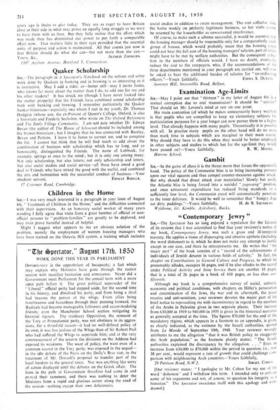Quaker SCholarship
Sia.—The paragraph in A Spectator's Notebook on the serious and sober work done by Quakers in banking and in brewing is as interesting as it is instructive. May I add a rider, or—better still—may I invite Janus, who knows far more about the matter than 1 do, to add one for me and his other readers? It has struck me (though I have never looked into the matter properly) that the Friends have combined sound scholarship both with banking and brewing. I remember particularly the Quaker banker-historians—especially two whom I met in my youth, Dr. Thomas Hodgkin (whose son, the ex-Provost of Queen's College, Oxford, is also a historiah) and Frederic Seebohm, who wrote on The Oxford Reformers and The Early Village Community. I am not sure whether Dr. Edwyn Bevan (the author of The House of Seleucus) should be included among the brewer-historians ; but 1 imagine that he was connected with Barclay, Bevan and Perkins. I leave it to Janus to correct me, and to complete the list. I cannot but think that he will find much to add about the combination of business with scholarship which has so long, and so honourably, distinguished the Friends. The name of Lubbock, for example, springs at once to the mind ; but it is only one among many. Not only scholarship, but also letters; not only scholarship and letters, but also social studies and social service—all these have owed a good deal to Friends who have mixed the good with the useful, and combined the arts and humanities with the successful conduct of business.—Your


































 Previous page
Previous page